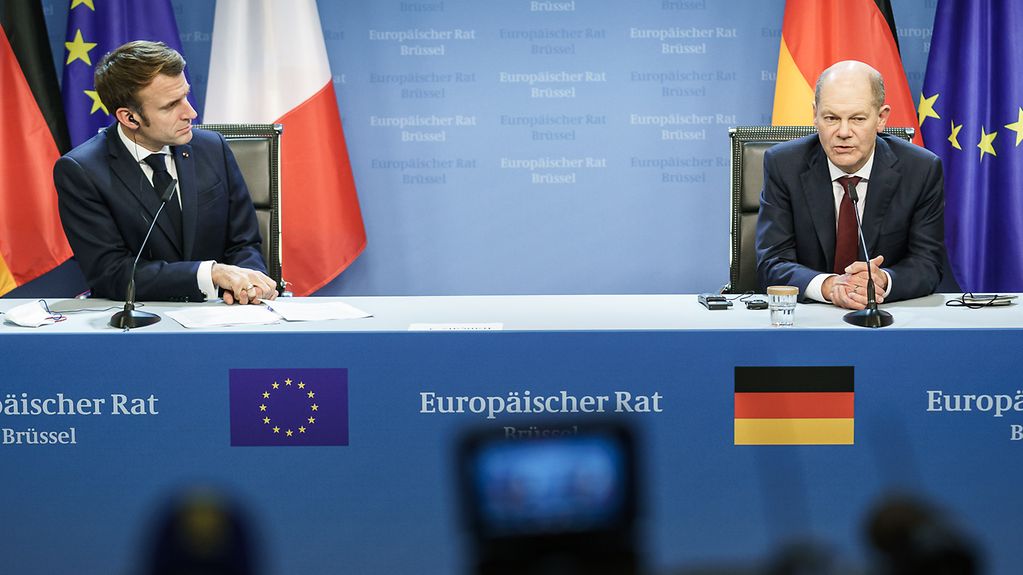EU Summit in Brussels
Federal Chancellor Scholz attended the European Council meeting in Brussels for the first time. At a press briefing with French President Macron, he stressed the importance of joint action – on foreign policy issues such as the situation in Ukraine and in the fight against the coronavirus pandemic as well as in other areas.

Taking stock together after protracted deliberations: Federal Chancellor Scholz with French President Macron.
Photo: Federal Government/Denzel
Federal Chancellor Olaf Scholz attended the European Council in Brussels for the first time one week after taking office. European Union leaders discussed issues such as the recent Russian troop movements on the border with Ukraine. It was of the utmost importance that Europe’s borders should not be altered and that everyone should enjoy security, said Scholz after the consultations on Friday night at a joint press briefing with French President Macron.
In its final declaration, the European Council stressed the urgent need for Russia to de-escalate tensions. Any further military aggression against Ukraine would entail “grave consequences and high costs, including restrictive measures coordinated with partners”.
According to Federal Chancellor Scholz, all members agreed that anyone violating such limits would have to be prepared to expect the appropriate response. He said that the Federal Government had urged for the so-called “Normandy format” to be revived involving Germany and France.
Situation at the EU’s external border with Belarus
Another foreign policy issue on the European Council agenda was the hybrid attack by the Belarusian regime and the refugee situation on the EU’s external border with Belarus.
The Federal Chancellor said that the EU had shown its solidarity with the Baltic states and Poland, and that this was something he very much welcomed. The regime had been asked not to abuse people, he said. In addition, he said, Europe had been able to contribute to reducing the number of people being flown to Belarus, and there had even been return flights. “This is another demonstration of what Europe is capable of when it acts in solidarity,” said Scholz.
Focus on the COVID-19 pandemic
The COVID-19 pandemic was another focus of the European Council meeting, which was only held for one day on this occasion. The heads of state and government discussed the current pandemic situation and the spread of the Omicron variant.
“This remains a major global and European challenge and we must all work together to move things forward,” said Scholz. It was crucial to ensure “that we are able to protect the health of our citizens while at the same time maintaining economic stability,” he said. It was also important “not just to look after ourselves but to ensure that the rest of the world is vaccinated, too,” he said, adding that the vaccine procurement initiative COVAX had a key role to play in this regard.
The European Council re-affirmed that vaccination was essential to fight the pandemic: in its final conclusions it stated that vaccinations were available to everyone and that booster jabs were vital and urgently needed, also saying that it was important in this connection to overcome vaccination hesitancy, not least by combating disinformation.
In addition, the heads of state and government discussed the EU’s response capability and resilience to future crises.
Dealing with rising energy prices
The European Council once again addressed the issue of energy prices. These have been seeing sharp increases in Europe and the world for some time. EU member states have already responded by discussing the issues at various forums, including at the European Council meeting in October.
The Federal Chancellor said that no conclusions had been reached yet, but that it had been agreed that price developments in the energy markets had to be closely monitored and that “we have to take steps to ensure these developments improve”.
Consultations on the Strategic Compass
Security and defence policy was another issue on the agenda of the heads of state and government. The focus here was on work on the Strategic Compass – the EU’s set of strategic goals in the area of security and defence. It seeks to answer questions about who and what Europe has to defend itself against and what measures are necessary in order to achieve this. The final Strategic Compass is to be adopted during the French EU Presidency in the first half of 2022.
Migration and external relations
The heads of state and government also talked about the so-called “external dimension of migration”. This concerns the EU’s cooperation with key countries from which refugees come to Europe, namely the countries of origin and transit and also the receiving countries. Scholz said that the member states were seeking to coordinate refugee policy in Europe in general and had made further determinations to this end.
Euro Summit
Finally, as is customary in December, the heads of state and government met for the Euro Summit in the so-called inclusive format, meaning that all 27 heads of state and government took part. ECB President Christine Lagarde and Eurogroup President Paschal Donohoe also attended. The agenda included the economic situation, the Capital Markets Union and the Banking Union.
Partnership with shared values
EU heads of state and government previously discussed closer ties with Eastern partners at the Eastern Partnership Summit on Wednesday. In their conclusions, they emphasised shared fundamental values. The EU’s relations with this region are of key strategic importance.
The joint summit statement said that there was a desire to reaffirm the strong commitment of the participating countries to “our strategic, ambitious and forward-looking partnership” based on shared core values. It went on to say that there was a common determination to further strengthen democracy and the rule of law in the societies of the countries concerned.
The Eastern Partnership Summit involved the leaders of the EU, the EU member states and Armenia, Azerbaijan, Georgia, the Republic of Moldova and Ukraine. Belarus suspended its participation in the Eastern Partnership in June 2021.